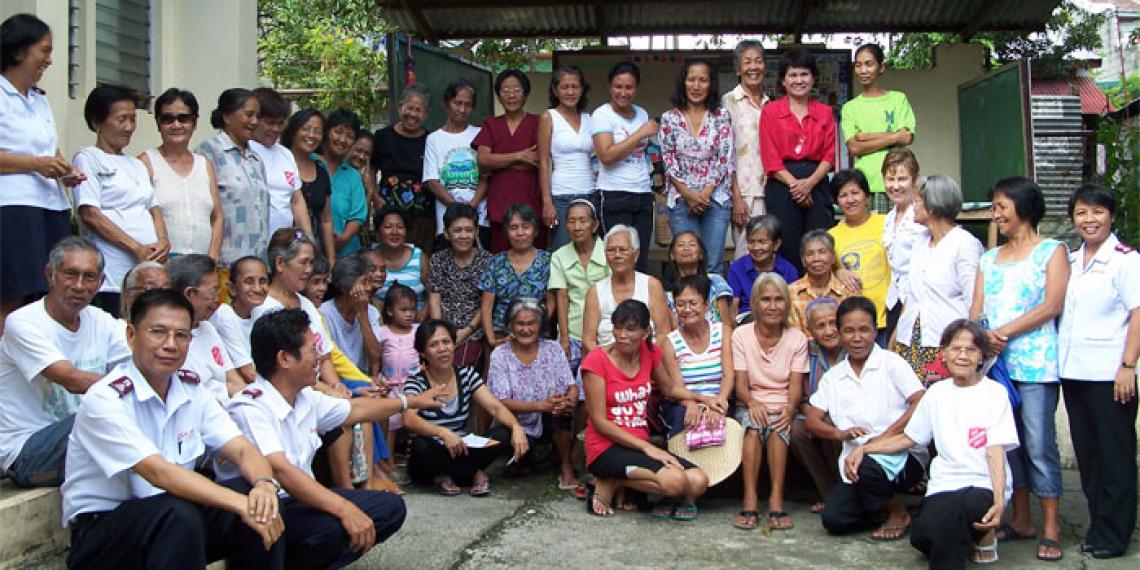You are here
Building Partnerships to Fight Poverty

Children living in poverty in the Philippines are now coming top of their class, thanks to a programme funded by the New Zealand, Fiji and Tonga Territory.
In August, Overseas Development Officer Major Vyvyenne Noakes made a monitoring visit to the Philippines. She followed up 15 children living in extreme poverty who have been funded for six years’ education at The Salvation Army’s Asingan School. This is the first school scholarship programme in the Philippines and the results have been outstanding.
Four of the children came top of their year at school. ‘Extreme poverty is very evident in the Philippines when you see families making their homes on the street footpath, under motorway flyovers and under bridges. But none of the other pupils at the school know that these children come from poverty,’ says Vyvyenne. ‘Although it’s only 15 children, we’ve been able to make a difference in their world—and it’s 15 children who will now be able to make a difference in their community.’
Vyvyenne asked each child what they wanted to be when they grew up and was touched by their various answers, which included becoming teachers, pilots, doctors and nurses. ‘It’s amazing because instead of scavenging, they’ve got a future now.’ The parents are equally dedicated to their children’s education—about half walk so far with their child to school that it’s not worth going home again, so they wait all day in the parents’ room. ‘They are just so grateful,’ says Vyvyenne. ‘It’s very humbling.’
Vyvyenne also visited Bagong Silong Corps in Caloocan City, which is in the heart of one of Manilla’s most overcrowded districts. Thanks to F.O.O.D. (Families Offer One Dollar) funding, where New Zealand Salvationists give a dollar a week, the corps is providing meals each week to 95 widows, single mothers and the elderly. Because the corps has no kitchen, food is cooked with stones on the ground and dishes are washed in a basin. ‘In our projects we always try to encourage sustainability, but sometimes people need to be fed first. I see the F.O.O.D. funding as an offering given from our territory,’ says Vyvyenne.
When she visited last year, Vyvyenne was asked if it was possible to provide funding for an adult to visit a doctor once a year. That’s why this year, Salvationists have the opportunity to give a $40 ‘Gift of Hope’ that will go toward two visits to the doctor each year, along with any medication needed. ‘We can’t possibly imagine what it’s like to live in such poverty and sickness,’ says Vyvyenne. ‘The scary thing is the amount of people who have died between last year and my visit this year.’
But it was her visit to Bethany House that was perhaps the most poignant. In a secret location, this is a home for girls aged 10-22 who have been rescued from trafficking or sexual abuse. Each girl lives there for an average of four to five years, where they receive counselling, school education, learn crafts and take part in the local corps. The girls sang ‘Jesus is my Best Friend’ and ‘Heart of Worship’ while Vyvyenne listened. ‘Music is therapy. These girls have been traumatised by what they’ve been through, and music is a way of releasing emotion.’ But Bethany House is not equipped with music or sports equipment, so Vyvyenne aims to raise funds to provide some of these basic items.
In her role, Vyvyenne works with International Headquarters (IHQ) in London to ensure delivery of the right funding, in the right places. The Salvation Army ‘sits down with local communities to find possible solutions for the problems they consider important’, she explains. Proposals for funding are then picked up by different territories, within their worldwide zones. ‘People in these countries can’t apply for grants or have access to benefits, but in our country we can.’
Last year, Vyvyenne applied to the New Zealand Government for funding for a women’s literacy and numeracy programme in West Kenya, and received $500,000. The programme helps women to set up village banks, and provide start-up loans for small businesses. Over 500 groups have been able to take out loans and start businesses, ranging from tie-dying to bread-making to diabetes testing. It’s a programme that has transformed the local community.
‘We are one army—that’s our strength’ says Vyvyenne. ‘It’s not just about giving money overseas; it’s about building partnerships with people.’
As told to Ingrid Barratt (War Cry 5 October 2013, p5-7)
For more information about how you can help with Salvation Army overseas development initiatives, please contact:
Major Vyvyenne Noakes
P: (04) 802 6269, e: vyvyenne_noakes@nzf.salvationarmy.org